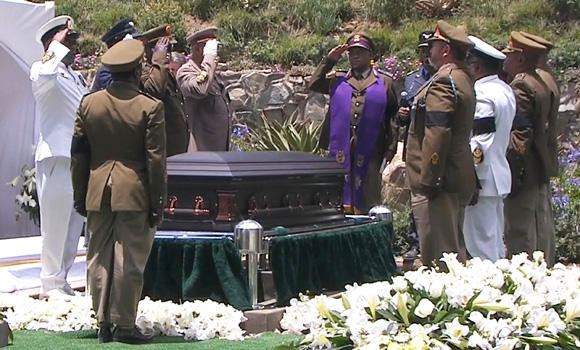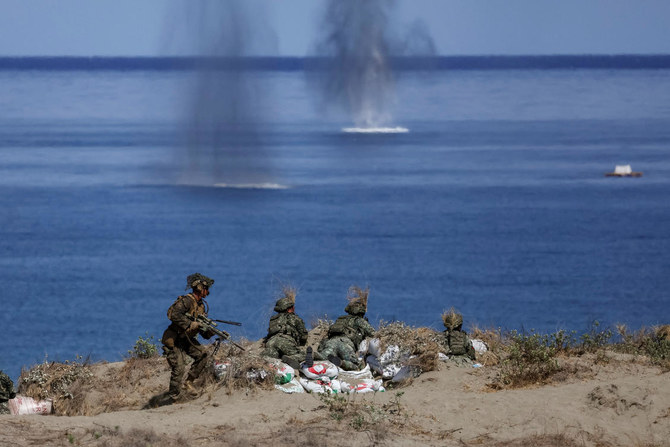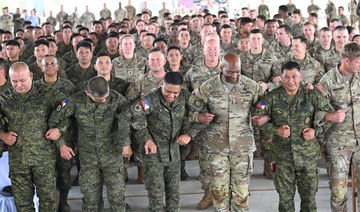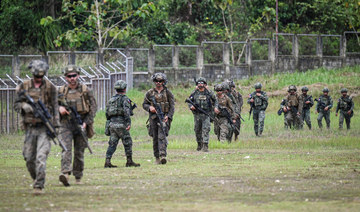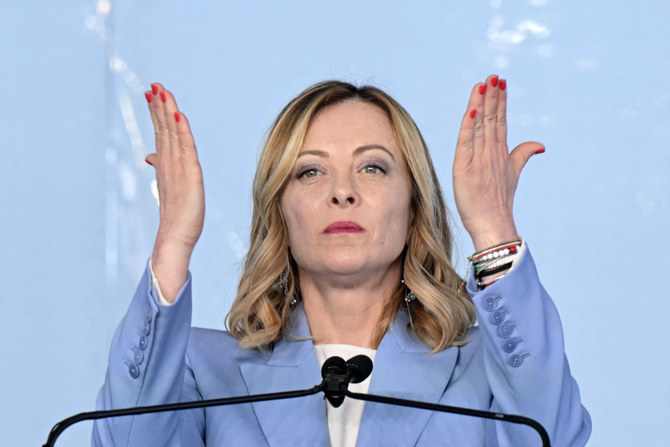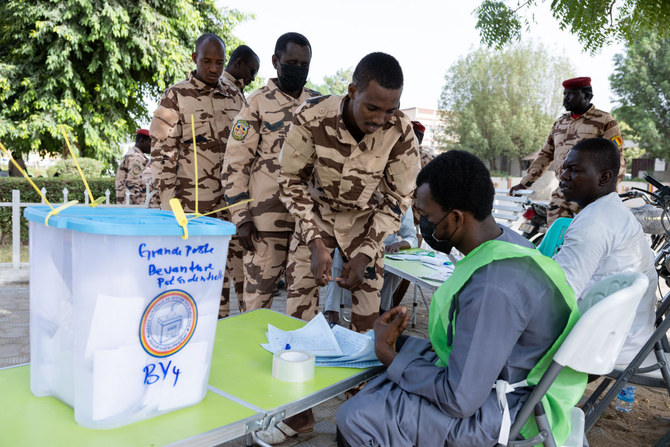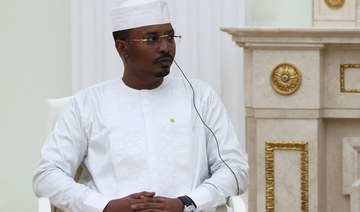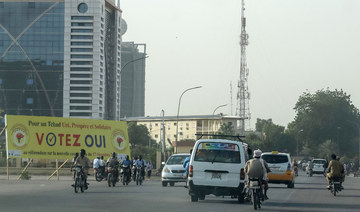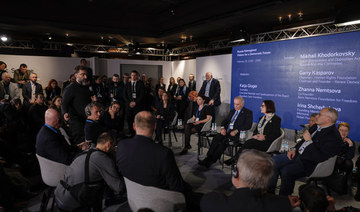QUNU, South Africa: South Africa buried Nelson Mandela on Sunday, leaving the multi-racial democracy he founded without its living inspiration and still striving for the “Rainbow Nation” ideal of shared prosperity he had dreamed of.
The Nobel peace laureate, who was held in apartheid prisons for 27 years before emerging to preach forgiveness and reconciliation, was laid to rest at his ancestral home in Qunu after a send-off combining military pomp with the traditional rites of his Xhosa abaThembu clan.
As the coffin was lowered into the wreath-ringed grave, three army helicopters flew over bearing the South African flag on weighted cables, a poignant echo of the anti-apartheid leader’s inauguration as the nation’s first black president nearly two decades ago.
A battery fired a 21-gun salute, the booms reverberating around the rolling hills of the Eastern Cape, before five fighter jets flying low in formation roared over the valley.
“Yours was truly a long walk to freedom, and now you have achieved the ultimate freedom in the bosom of your maker,” armed forces Chaplain General Monwabisi Jamangile said at the grave site, where three of Mandela’s children already lie.
Among the 450 mourners at the private burial ceremony were relatives, political leaders and foreign guests including Britain’s Prince Charles, American civil rights activist Reverend Jesse Jackson and talk show host Oprah Winfrey.
Mandela died aged 95 in Johannesburg on Dec. 5, plunging his 52 million countrymen and women and millions more around the world into grief, and triggering more than a week of official memorials to one of the towering figures of the 20th century.
Over 100,000 people paid their respects in person at Mandela’s lying in state at Pretoria’s Union Buildings, where he was sworn in as president in 1994, an event that brought the curtain down on more than three centuries of white domination.
When his body arrived on Saturday in Qunu, 700 km (450 miles) south of Johannesburg, it was greeted by ululating locals overjoyed that Madiba, the clan name by which he was affectionately known, had “come home.”
“After his long life and illness he can now rest,” said grandmother Victoria Ntsingo. “His work is done.”
“GREATEST SON“
Before the burial, 4,500 family, friends and dignitaries attended the state funeral service in a huge domed tent, its interior draped in black, in a field near Mandela’s homestead.
The flag-covered casket was carried in by military chiefs, with Mandela’s grandson and heir, Mandla, and South African President Jacob Zuma following in their footsteps.
It was then placed on black and white Nguni cattle skins in front of a crescent of 95 candles, one for each year of Mandela’s life, as a choir sang Nkosi Sikelel’ iAfrika, the national anthem adopted after the end of apartheid in 1994.
“The person who is lying here is South Africa’s greatest son,” said Cyril Ramaphosa, deputy leader of the ruling African National Congress (ANC), who presided over the three-hour ceremony broadcast live across the nation and around the world.
From the Limpopo River in the north to Cape Town in the south, millions watched on television or listened to the radio. In some locations, big screens transmitted the event live.
“Qunu is too far to go, so I gathered with some people here so we can mourn together. I can say he is a hero, a man of the people,” said 29-year-old Message Sibanda, among about 100 others watching in Johannesburg’s Sandton financial district.
“FAREWELL, MY BROTHER“
At the service, touching tributes were paid to the father of the “Rainbow Nation” he helped forge from apartheid’s ashes.
“Farewell my dear brother, my mentor, my leader,” said lifelong friend and fellow Robben Island inmate Ahmed Kathrada, his voice cracking with emotion, drawing tears from mourners.
In his eulogy, Zuma paid tribute to a life that went from freedom-fighter to political prisoner to president. He also briefly turned attention to the future, pledging to continue Mandela’s quest for a free and equal society, free from racial discrimination.
“Whilst the long walk to freedom has ended in the physical sense, our own journey continues. We have to continue building the type of society you worked tirelessly to construct. We have to take the legacy forward,” Zuma said.
The intense spotlight on the departed Mandela has highlighted the gulf in stature between him and the scandal-plagued Zuma. The current president is increasingly criticized for not doing enough to reduce poverty and chronic unemployment and end gaping income disparities that make South Africa one of the most unequal societies in the world.
“DON’T CALL ME“
Mandela served just one term as leader of Africa’s biggest and most sophisticated economy, and formally withdrew from public life in 2004, famously telling reporters at the end of a farewell news conference: “Don’t call me, I’ll call you.”
His last appearance in public was at the 2010 World Cup final in Johannesburg’s Soccer City stadium, waving to fans from the back of a golf cart.
Yet such was his influence as the architect of the historic reconciliation between blacks and whites that his passing has left a gaping hole at the heart of South Africa’s psyche.
With an eye on elections in five months, the ANC, the 101-year-old former liberation movement Mandela once led, has seized on his death as a chance to shore up popularity that is ebbing even in its black support base.
This calculation backfired badly at a Mandela memorial in Johannesburg on Tuesday when Zuma, under fire for a $21 million security upgrade to his private home, was booed and jeered in front of world leaders including US President Barack Obama.
But barring an upset next year, Zuma looks set for another five years in office, during which he will have to address an economy struggling to shake off a 2009 recession and the fragmentation of a vital ANC alliance forged with the unions in the common struggle against apartheid.
With unemployment at 25 percent and racial inequality still painfully evident — the average white household earns six times more than the average black one — pressure for radical economic transformation is only likely to increase.
Against that backdrop, the party is desperate for strong leaders to guide South Africa through the complexities of the 21st century global economy and allow it to claim what it believes is its rightful place at the world’s top table.
There are questions whether Zuma, a polygamous Zulu traditionalist with no formal education, can deliver this.
“We need to raise the level of leadership,” former president Thabo Mbeki, who was unceremoniously ousted by Zuma six years ago, said in eulogies to Mandela last week.
“The transformation of South Africa is a very difficult task, I think in many respects more difficult than the struggle to end the system of apartheid.”
(Additional reporting by David Dolan, Olivia Kumwenda-Mtambo and Pascal Fletcher in Johannesburg)


